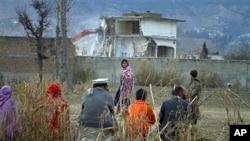A study of newly declassified documents recovered from Osama bin Laden's compound in Pakistan last year reveals a terrorist leader frustrated with regional jihadi groups and his own inability to exercise control over them.
The Combating Terrorism Center at the U.S. military academy at West Point says the late al-Qaida leader's frustration is the "most compelling story to be told" by the 17 declassified documents. The privately-funded research institution released the documents and its analysis of them on Thursday.
The center says contrary to what many people thought, bin Laden was not "the puppet master pulling the strings that set in motion jihadi groups around the world."
U.S. special commandos killed bin Laden in a covert raid on his house in the Pakistani garrison town of Abbottabad on May 2, 2011. The assault team confiscated a wealth of material, including video clips and personal correspondence.
The Combating Terrorism Center says the focus of bin Laden's private letters is Muslims' suffering at the hands of his jihadi "brothers." The center's report says bin Laden was "burdened by what he viewed as the incompetence" of the al-Qaida affiliates, including their "poorly planned operations which resulted in the unnecessary deaths of thousands of Muslims."
The al-Qaida leader was reportedly "at pains" advising the groups to stop domestic attacks that cause Muslim civilian casualties. Instead, he wanted them to focus on the United States, which he described as "our desired goal."
Bin Laden wanted especially to target airplanes carrying then-commander of U.S. and NATO forces in Afghanistan General David Petraeus and U.S. President Barack Obama. The Combating Terrorism Center says he explained that President Obama's death would see the "utterly unprepared" Vice President Joe Biden assume the presidency and send the U.S. into crisis.
Some information for this report was provided by AP, AFP and Reuters.




